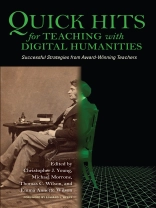Quick Hits for Teaching with Digital Humanities: Successful Strategies from Award-Winning Teachers is an edited collection of 24 articles that aims to introduce faculty, administrators, and staff to ways in which digital techniques from the arts, humanities, and social sciences can be incorporated in the classroom. These techniques can enhance learning and professional development experiences for undergraduate and graduate students and faculty alike. This essential handbook illustrates the breadth of digital humanities across the disciplines with rich examples that bring best practices to life. Anyone who teaches at an institution of higher learning will find entry into new digital paradigms. As the authors share simple and complex ways to introduce digital humanities into the classroom, they expand understandings of what constitutes these current technologies for learning.
Inhoudsopgave
Edward L. Ayers / Foreword
Michael Morrone / FACET Director’s Welcome
Christopher J. Young, Michael Morrone, Emma Annette Wilson, and Thomas C. Wilson / Introduction
I. Overview of Ways to Teach with Digital Humanities
1. Elizabeth Matelski / Social Network Analysis: Visualizing the Salem Witch Trials
2. Camden Burd / Close Reading and Coding with the Seward Family Digital Archive: Digital-Documentary Editing in the Undergraduate History Classroom
3. Robert Voss / Teaching with Digital Humanities: Engaging your Audience
4. Mary Alexander, Connie Janiga-Perkins, and Emma Annette Wilson / Teaching Text Encoding In The Madre María de San José (México 1656-1719) Digital Project
5. Adam Clulow, Bernard Z. Keo, and Samuel Horewood / Teaching with Trials: Using Digital Humanities to Flip the Humanities Classroom
6. Brian Kokensparger / Corpus Visualization: High-Level Student Engagement on a Zero Budget
7. Lisa Mc Fall / Metadata in the Classroom: Fostering an Understanding of the Value of Metadata in Digital Humanities
8. Mary Angelec Cooksey / Teaching the Philosophy of Computing Using the Raspberry Pi
9. Robert Voss / Teaching Digital Humanities with Timeline.js
10. Katherine Wills and Robin D. Fritz / Authentic Instruction through Blogging: Increasing Student Engagement with Digital Humanities
II. Supporting Teaching and Learning
11. Armanda Lewis / Capacity Building for DH Pedagogy Supports: An Ecological Approach
12. James Roussain and Silvia Vong / From Researcher to Curator: Reimagining Undergraduate Primary Source Research with Omeka
13. Hélène Huet and Laurie N. Taylor / Teaching Together for the Digital Humanities Graduate Certificate
14. Serenity Sutherland / Graduate Training in the Digital Archive
15. David Ainsworth / Digital Humanities and Undergraduate Research for Undergraduates
16. Kirsta Stapelfeldt, Christine Berkowitz, Chad Crichton, Anne Milne, Alejandro Paz, Natalie Rothman and Anya Tafliovich / Pay it Forward: Collaboration and DH Capacity Building at the University of Toronto Scarborough
17. Scot A. French / Visual Eyes This: Using Interactive Visualization Tools to Engage Students in Historical Research and Digital Humanities R&D
3. Mapping and Augmented Realities
18. Clifford B. Anderson and Joy H. Calico / The Digital Flâneur: Mapping Twentieth-Century Berlin
19. Stephen Buttes / Digital Maps as Content and Pedagogy: Alternative Cartographic Practices in the Humanities Classroom
20. Jacqueline H. Fewkes / Fieldtrips and Classrooms in Second Life: A Few Realities of Teaching in a Virtual Environment
21. Sofiya Asher and Theresa Quill / Narrative Maps for World Language Learning
22. Julia M.Gossard / Digitally Mapping Space and Time in History General Education Surveys: Google Maps & Timeline JS
23. Molly Taylor-Poleskey / Charting Urban Change with Digital Mapping Tools
24. Justin B. Makemson / Shifting Frames of Interpretation: Place-Based Technologies and Virtual Augmentation in Art Education
25. Lisa Siefker Bailey / Using Podcasts to Teach Short Stories
IV. Public Scholarship and Community Engagement
26. J. Michael Francis, Hannah Tweet, and Rachel L. Sanderson / Building La Florida: Rethinking Colonial Florida History in the Digital Age
27. Zach Coble and Rebecca Amato / (Dis)Placed Urban Histories: Combining Digital Humanities Pedagogy and Community Engagement
28. Rhonda J. Marker / Digital Exhibitions: Engaging in Public Scholarship with Primary Source Materials
29. Samantha J. Boardman / Oral History In The Digital Age: The Krueger-Scott Collection
30 Carmen Walker / The Infusion of Digital Humanities in an Introductory Political Science Course at an HBCU: Lessons Learned
31. Juilee Decker / No More ‘Dusty Archive’ Kitten Deaths: Discoverability, Incidental Learning, and Digital Humanities
32. Mary R. Anderson and William M. Myers / Global Engagement and Digital Technology
33. Patricia Turner / Using Digital Humanities to Re-Imagine College Writing and Promote Integrated and Applied Learning
34. Shawn Martin and Carey Beam /Early Indiana Presidents: Incorporating Digital Humanities, Public History, and Community Engagement
35. Evan Roberts/ Measuring the ANZACs: Exploring the Lives of World War I Soldiers in a Citizen Science Project
36. Lauren S. Cardon/ Global Foodways: Digital Humanities and Experiential Learning
List of Contributors
Index
Over de auteur
The Faculty Academy on Excellence in Teaching (FACET) was established as an Indiana University Presidential Initiative in 1989 to promote and sustain teaching excellence. Today, FACET involves over 600 full-time faculty members, nominated and selected through an annual campus and statewide peer review process. Michael C. Morrone is Director of the Faculty Academy on Excellence in Teaching (FACET) and is a senior lecturer in the Kelley School of Business at Indiana University Bloomington. Thomas C. Wilson is Professor and Associate Dean for Research and Technology at the University of Alabama Libraries. Emma Annette Wilson is Assistant Professor of English at Southern Methodist University. Christopher J. Young is Assistant Vice Chancellor for Academic Affairs, Director for the Center for Innovation and Scholarship in Teaching and Learning, and Professor of History at Indiana University Northwest.












